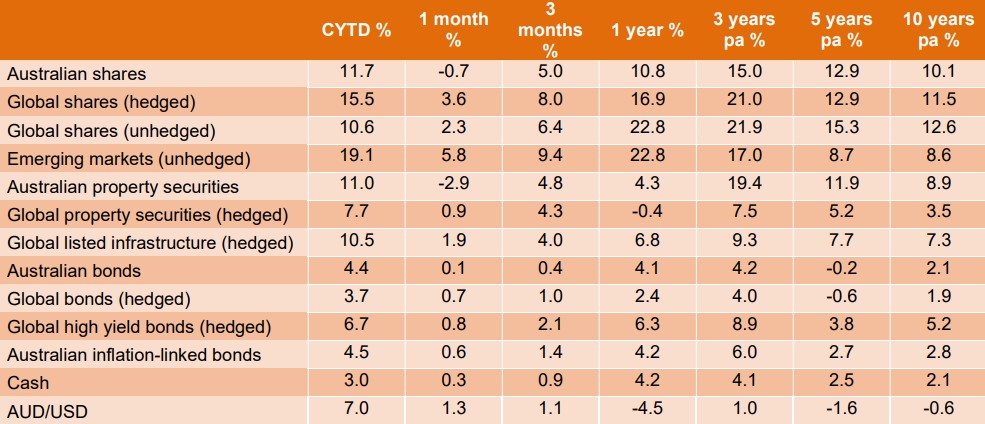September markets wrap: Inflation, rate caution and sector shifts shape ASX
Key events in September 2025
- Australian shares retreated from their historic highs in August with a modest fall in September. The energy
sector recorded a sharp decline of -9.1% with the Santos takeover being abandoned. A weak performance from the Healthcare sector (-4.7%), given concerns that CSL is scaling back its global business operations, was also a negative contributor to market returns. Consumer staple sector shares also fell sharply (-4.2%)
with Woolworths disappointing with their profit report. By contrast, there was a strong positive performance
from the Resources sector (+4.1%) with the large rises in the gold and metal prices.
- Australia’s economic data is a mix of positives and negatives. Consumer spending picked up further in July
in response to the Reserve Bank of Australia (RBA) lowering interest rates back in May. However, the
labour market disappointed with a small loss in jobs in August. Australia’s annual inflation climbed to 3.0%
in August compared to only 1.9% in June. This has seen the RBA keep the cash interest rate steady at
3.6% but also notably expressing caution about the slower progress in reducing inflation.
- US share prices have reached new historic highs. Technology companies, including Apple, Microsoft and Nvidia, have led the charge. US economic activity has been mixed, with solid consumer spending being countered by a sharp slowing in job growth. The US central bank responded to the downside risks to the jobs market with a 0.25% cut in US interest rates in September. This reduction in interest rates comes despite US consumer annual inflation rising from 2.7% in July to 2.9% in August.
- Chinese shares delivered very strong returns, given optimism that stimulus measures from the national government will support economic activity. This optimism is contrasted by the subdued August industrial production and retail sales results, with Chinese residential property prices also continuing to fall.
Asset class summary
Asset class returns in Australian dollars – periods to 30 September 2025

Key events in global markets over the last three months to September 2025
Global shares (hedged) delivered a very strong 8.0% return for the quarter. A solid rise in the Australian Dollar versus the US Dollar, Euro and Japanese Yen reduced the Global shares (unhedged) to a strong 6.4% gain.
Optimism on Artificial Intelligence (AI) prospects and lower US interest rates have been key drivers of rising share prices. Notably, Wall Street’s benchmark S&P 500 Index ended the quarter near historic highs with a quarterly gain of 8.0%. Investors have taken the view that President Trump’s tariffs are just a temporary threat in terms of higher US inflation and penalising global exports to the United States.
Asian share markets have also delivered impressive performances. China delivered an exceptionally strong 19.7% return in local currency terms. The Chinese government's efforts in providing more financial support to counteract tariffs and a weak residential property market have seen Chinese shares make a strong recovery. Taiwan (19.3%) and Korea (17.2%) also posted exceptionally strong returns over the past three months. Japan’s share market delivered a 10.4% return with the central bank taking a more cautious stance on raising interest rates despite persistent inflation.
Global bonds (hedged) delivered a 1.0% quarterly return, given optimism that the US central banks would continue to lower interest rates over the coming months, given slower jobs growth. Australian bonds only delivered a modest 0.4% quarterly return. Higher Australian inflation results for July and August have diminished hopes for the RBA lowering interest rates again this year.
Key events in Australia over the last three months to September 2025
Australian shares delivered a solid 5.0% return for the quarter. The Resources sector was a key positive driver with a 19.8% quarterly return given more encouraging Chinese growth prospects. There was a solid performance from the industrial sector (4.3%) with business surveys indicating an improvement in trading conditions after the RBA cut interest rates in May and August. Property securities also delivered a strong 4.8% quarterly return with the benefit of lower interest rate settings by the central bank.
Australia’s economy is experiencing modest consumer spending but slower job creation. Lower mortgage interest rates and wages growth finally exceeding inflation suggests that consumer prospects may be brightening compared to the tough “cost of living” crisis of recent years.
Global prospects
Enthusiasm for AI and technology have been the key factors supporting rising global share prices in recent years.
Lower global inflation has also allowed central banks to selectively cut interest rates, which has also been favourable. Typically, a lower interest rate environment can boost corporate profits and thereby share prices.
President Trump’s tariff agenda is still a threat but investors are giving this the ‘benefit of the doubt’. As tariffs are a tax that increases consumer prices, the risk of higher US inflation to both global share prices as well as bond yields is still on the radar. While President Trump has negotiated tariff agreements with both Europe and Japan, there is still no agreement with China and there is continued tensions with Brazil and India.
Global share markets are also challenged by considerable global political risks. The Russian-Ukrainian war is still casting a shadow over Europe, which has generated insecurity and motivated large increases in defence spending. The precarious Middle East political climate is also a major threat to global oil supplies.
Australia’s economic prospects are also vulnerable to political tensions between China and the United States. Given China is the key export destination for circa 30% of Australian exports, the relationship between Beijing and Washington is critical to Australia’s national income and security. Tensions over trade, tariffs or Taiwan would be a major challenge to Australia’s economy and share market prospects.
Given these complex and significant risks, investors should maintain a disciplined and diversified strategy.
Stay informed
Our insights aim to keep you up to speed with issues driving the world’s investment markets. Get the latest thinking from our fund managers, and see what’s happening at MLC Asset Management. Find out more here.
2 topics

